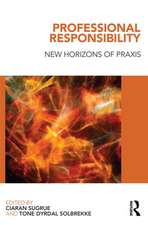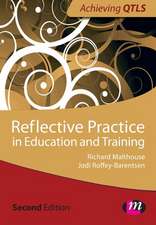Developing Highly Qualified Teachers: A Handbook for School Leaders
Autor Allan A. Glatthorn, Brenda K. Jones, Ann Adams Bullocken Limba Engleză Paperback – 20 dec 2005
- quality induction programs;
- working with marginal teachers;
- using self-directed development for quality teachers;
- using cooperative development for quality teachers;
- working with mentors;
- linking staff development with teacher development.
Addressing the NCLB guidelines, this book will help you develop a strong faculty of highly qualified teachers.
| Toate formatele și edițiile | Preț | Express |
|---|---|---|
| Paperback (1) | 224.87 lei 43-57 zile | |
| SAGE Publications – 20 dec 2005 | 224.87 lei 43-57 zile | |
| Hardback (1) | 456.39 lei 43-57 zile | |
| SAGE Publications – 5 dec 2005 | 456.39 lei 43-57 zile |
Preț: 224.87 lei
Nou
43.03€ • 45.05$ • 35.60£
Carte tipărită la comandă
Livrare economică 07-21 aprilie
Specificații
ISBN-10: 0761946381
Pagini: 144
Dimensiuni: 178 x 254 x 10 mm
Greutate: 0.3 kg
Ediția:1
Editura: SAGE Publications
Colecția Corwin
Locul publicării:Thousand Oaks, United States
Recenzii
Cuprins
Acknowledgments
About the Authors
Part I. The Foundations
1. Understanding and Owning the Concept of Highly Qualified Teachers
Understanding the Concept of Highly Qualified Teachers
Owning the Concept of the Highly Qualified Teacher
Using Guidelines for Leadership
A Final Note
2. Recruiting Highly Qualified Teachers
Understanding the Need for Recruitment
Using General Strategies
Using Strategies That Respond to System Needs
Recruiting Graduates From Alternative Programs
Expanding the Sources
A Final Note
3. Selecting Highly Qualified Teachers
Strategies to Use in the Preliminary Stage
Strategies to Use in the Middle Stage
Strategies to Use in the End Stage
Appendix: Overview of Employment Law
Part II. The General Strategies
4. Designing Your Own Model of Faculty Development
How Differentiated Supervision Works
Evaluation of the Differentiated System
Developing a Homegrown Differentiated Model
5. Implementing a Quality Staff Development Program for All Teachers
Defining the Concept of Staff Development
Understanding the Background of Staff Development
Choosing an Appropriate Model of Staff Development
Implementing Staff Development Effectively
Putting It All Together
A Final Note
Part III. The Specific Approaches
6. Developing a Quality Induction Program for New Teachers
Importance of Induction Programs
Organizational Structures Needed
Special Needs of New Teachers
Features of Effective Induction Programs
Services Provided
Use of Technology
Evaluation of Induction Programs
A Final Note
7. Working With Marginal Teachers
Defining the Term and Identifying the Marginal Teacher
Developing the Marginal Teacher
Evaluating the Marginal Teacher
Making a Final Decision
Helping Marginal Teachers With Special Problems
A Final Note
8. Using Self-Directed Development With Highly Qualified Teachers
Understanding the Nature of Self-Directed Development
Analyzing the Advantages and Disadvantages of Self-Directed Development
Using Implementation Strategies
Seeing How It Might Operate at the School Level
9. Using Cooperative Development With Highly Qualified Teachers
A Rationale for Using Teams for the Development of Teachers
A Structure for Cooperative Development
Activities to Help in the Development of Teachers
Cautions to Keep in Mind in Using Teams
10. Working With Mentors to Develop Highly Qualified Teachers
Understanding the Nature of Mentoring
Selecting Mentors
Training Mentors
Identifying Mentor Functions
Solving Mentor Problems
11. Using Curriculum Development as Faculty Development
A Rationale for Curriculum Development as Faculty Development
Using Curriculum Standards
Developing Positive Faculty Attitudes
Developing a Scope and Sequence Chart
Developing Long-Term Plans
Painting a Portrait of the Year
Identifying the Titles of Units
Allocating Time to Each Unit
Recording Decisions in a Long-Term Calendar
Writing Units of Study
A Final Note
Part IV. The Results
12. Retaining Highly Qualified Teachers
Understanding the Importance of Retention
Analyzing the Reasons Teachers Leave Their Positions
Using General Processes for Retention
Using Specific Strategies
A Final Note
13. Developing the Faculty as a Cohesive Community
Reflect About Values and Practices
Communicate Cohesiveness
Reinforce Cohesiveness
Make Special Efforts
References
Index
Notă biografică
Allan A. Glatthorn (1924¿2007) was a major contributor to the third and fourth editions; his research used in the preparation of the first and second editions of Writing the Winning Thesis or Dissertation: A Step-by-Step Guide was the foundation for the third edition. He was the Distinguished Research Professor of Education (Emeritus) in the College of Education of East Carolina University, where he advised doctoral students, chaired dissertations, and taught courses in supervision and curriculum. He was formerly Professor of Education at the Graduate School of Education of the University of Pennsylvania. Prior to his university assignments, he was a high school teacher and principal. In his work as a professor, he chaired close to 100 dissertations. He is the author of numerous professional books, several of which have been published by Corwin.











